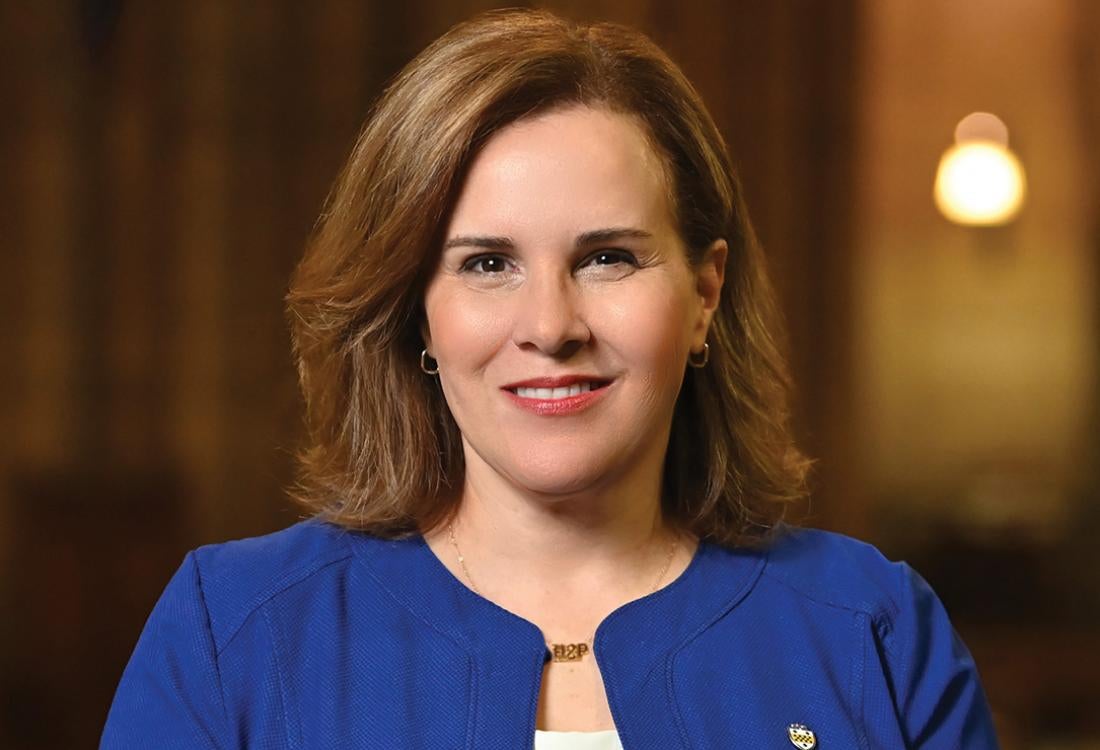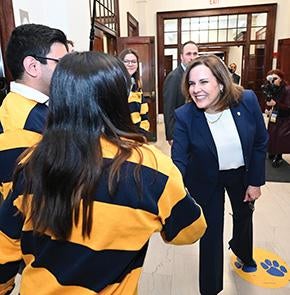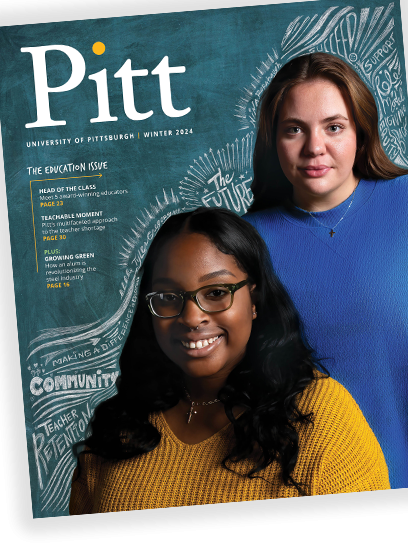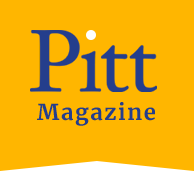It’s the beginning of another bright new era at the University of Pittsburgh.

On July 17, Joan Gabel began her tenure as Pitt’s 19th chancellor. She arrives from the University of Minnesota, where she served as president and chief executive of the system and its Twin Cities campus.
Just before her official start here, Chancellor Gabel sat down with Pitt Magazine to talk about her path to Pittsburgh, plans for the University’s future and why she wouldn’t want to be anywhere else.
Pitt Magazine Editor-in-Chief Laura Clark Rohrer: On behalf of the alumni community, welcome to Pitt! How are you finding Pittsburgh so far?
Chancellor Joan Gabel: Thank you! It’s fantastic — not that I didn’t know that already. My son is a student here, and my best friend from college lives here, so we’ve been here many times, but we’ve never lived here. Sometimes that transition from visiting to living can be bumpy. We’re actually finding the more we learn about Pittsburgh the more we like it — so we’re delighted.
PM: Let’s start with your priorities for the upcoming year. What’s at the top of your list for Pitt?
JG: I’ve got short-, mid- and long-term priorities. In the immediate future, we will be talking about the state budget and its implications. At the same time, I’ll be kicking off a lot of listening and get-to-know-you opportunities. One of the things I’ve learned over the course of my career is that you’ve got to listen. There’s value in experience, of course, but experience needs to be contextualized in the place’s nuances — those are the things that make it special. I’m looking forward to hearing feedback and insight from the people who have lived Pitt, know it, care the most about it or are the most affected by it. That will help us take what’s already a really great place that’s been under tremendous leadership and make it even better.
PM: Would you say this focus on listening is part of your leadership philosophy?
JG: Yes. I consider myself a collaborative leader. One of the reasons I’ve enjoyed and thrived in higher education environments is because shared governance is how I like to do things. You surround yourself with people who have a perspective, a point of view, expertise, passion and interest and come up with something greater than the sum of its parts. I understand that there are expectations in this role to lead and that there are also expectations to facilitate and follow, as the case may be. I think that range is part of what I like so much. It’s my natural method of doing this work and having it be successful and meaningful for everyone in the community.
PM: It sounds like that approach applied to your tenure as president of the University of Minnesota, another large, multifaceted university with a lot of stakeholders.
JG: It’s really applied to my work ever since I was a department chair. When you go out of your individual work as a member of the faculty and into facilitating a program or research center, your own scholarship and creativity require an appreciation for shared governance. It’s always been that way for me, even from the earliest administrative days.
PM: Speaking of your early days: You started your career practicing — and then teaching — law. How do you see that experience filtering into your work today?
JG: Everything builds on the cumulative. I’m biased, of course, but I think there’s always some value in having some legal training. But I think the main things about the early part of my career that cumulatively impact this job are the research, teaching and program building. Supporting students and creating strategic plans are applicable across disciplines. I think your training, your outlook and your lived experience always inform your leadership, but the main things that inform your leadership in higher ed are appreciating what students, faculty and staff need.
PM: Yes. Not losing sight of that classroom experience.
JG: That’s right. Knowing what is driving the University. Asking: Who are we? And how do we make it better?
PM: You mention lived experiences, and yours are somewhat unique. You were the first female president at University of Minnesota. Now, here you are, the first female chancellor at Pitt. How does this trailblazing affect how you approach your work?
JG: I don’t really know how to answer that question, and I’ll tell you why. I only have my own perspective. I’ve never not had this identity. So, I don’t know how it might be different if I wasn’t who I am. But I do know that I hear from a lot of people, whether they share my identities or not, that the progression represents optimism for them individually, professionally or personally, or for their institution. I’m very honored and humbled by that. But at the end of the day, it comes down to doing the work. And we all do our work and bring all our identities with us when we do it. And so sometimes I think that question is more easily answered by those affected by my role, rather than me in it, because I’m just doing my thing.
 PM: As you already know, being part of Pitt means being a vital partner in the region and the commonwealth. How do you envision continuing Pitt’s role as an economic anchor?
PM: As you already know, being part of Pitt means being a vital partner in the region and the commonwealth. How do you envision continuing Pitt’s role as an economic anchor?
JG: If you look at thriving regions across the country, there’s almost always an academic anchor. Why? Because at the epicenter of our work is learning, thinking and innovation and turning that innovation into real-life opportunities. For us here at Pitt, that innovation includes cures, treatments, medical technology and biotechnology — just to name a few. The idea of that whole portfolio and range of creativity is always going to involve drawing in industry partners and students who then meet. That is where the growth and magic happen, when our faculty, our students, our staff, our partners, our communities then grow. They’re growing new ideas, or new jobs, or new industry sectors, or new real estate development. In my experience, that’s a fun part — seeing how the university does its core work of educating students and engaging in discovery, and then facilitating the domino effect that work can have in terms of community impact. That’s why I want to be here. You can feel the energy and momentum, and Pitt is right at the center, literally and figuratively.
PM: Looking back, what are you most proud of accomplishing throughout your career?
JG: There are some very specific things that I’m proud of, particularly around programs I’ve helped launch or the way I’ve been able to set up students or groups of faculty to do something they wouldn’t otherwise have been able to do. But, as you ask that question, I think my answer is that I’ve been at the table for a lot of that progress while also having an amazing family. Being able to do both is something I’m so grateful for. I have a really amazing husband and I have really amazing children — although they are all adults now. And that’s what I’m most proud of.
PM: You mentioned that your son is a student here. What’s it like being a Pitt parent?
JG: Great. My son was a first-year in the first COVID year, so his experience has not been typical. But what I’ve seen is how the community pulled together, and how the academic quality, both from what I’ve seen in the aggregate and from his faculty and his classes, have all been of the highest order. It made me proud of his choice to be here. And it makes me feel confident when I now look at other parents — current and prospective — and say, “This is a good choice, trust me.”
PM: How did he choose Pitt?
JG: He had specific interests and figured out his range of options. Then — he’s a computer science student — he wrote an algorithm, and Pitt came out on top.
PM: Wow!
JG: I know. I can’t make it up. We did all the usual things — visited, spent some time here, talked to people and visited other institutions, too. But Pitt won the day on the screen and then in real life.
PM: What about for you? What made you pursue and accept this opportunity?
JG: Well, for years, I’ve been aware of Pitt’s reputation and how the trend lines are going upward. Higher ed is changing a lot right now — changes in how we compete, changes in the role of technology in learning experience, changes in the expectations for and from faculty and staff. These are national trends and there are some headwinds, without question. When you do this work, you think: Where do I want to face those headwinds? Where do I want to lean into those opportunities? What kind of a place do I want to be a part of? I found that I want to be here, at Pitt.
PM: One last thing before you go back into those headwinds: What should Pitt’s alumni know about the University as you begin your tenure?
JG: As great as things are, I think our best days are ahead of us. And I’m really looking forward to being a part of that.



